Friday 1 November 1940
On the less important coastal sector, the Italian troops finally close up with the dug-in Greeks at the Thyamis River. They capture Konitsa. The Greeks, under Major-General Nikolaos Lioumbas, are behind excellent natural defensive features. Further inland, the Greeks are dug in on the Kalpaki Line and tie in with the Greek troops defending in the Pindus Mountains.
On the fairly quiet northern sector of the front, the Greek 4th and 9th Infantry Divisions mount some probing attacks across the border toward Koritsa. Greek bombers attack the Koritsa airfield.
The Italian high command (Commando Supremo) realizes that it will need more troops in Albania. It orders the Bari and Trieste infantry divisions shipped to Albania forthwith.
The Italian Regia Aeronautica mounts major strategic bombing operations on Greek cities, including:
- Piraeus
- Salonika
- Larissa
- Corfu
- Corinth
- Candia (on Crete)
Italian Foreign Minister Galeazzo Ciano, who has led bombing missions previously in Abyssinia (and received his appointment as Foreign Minister as a result), volunteers and leads a bombing mission against Salonika. Also in his flight are bombers piloted by Bruno and Vittorio Mussolini. While obviously a publicity stunt, the more fervent fascist supporters (which at this point still number Ciano) are full of manly vigor and the martial spirit and do want to participate in stunts like this as an example.
Winston Churchill tells Mideast Command to send some bombers to Greece. About half the RAF bombers head north. Churchill is thinking strategically, wishing other neutral countries to see that Britain will stand behind them if attacked.
Turkey announces its neutrality in the conflict. However, Turkey is having an outsized influence on the campaign because it has threatened to intervene in some fashion if Bulgaria - a very tentative German ally - intervenes. This Turkish threat, based on a previous treaty (the Balkan Pact of 1935), keeps the Bulgarians from attacking Greece, which would dilute the Greek defense and cause them many military problems. Knowing that Bulgaria has been neutralized allows the Greeks to put all of its troops in the mountains to oppose the Italians.
Greek destroyers Spetsai and Psara continue bombarding Italian positions along the coast.
German Government: General Enno von Rintelen, the military attaché in Rome, submits a report to Hitler which describes the slow pace of Italian operations in Greece. This is hardly a secret; media outlets around the world already are describing the Italian invasion as an incompetent sideshow.
The report, though, sets Hitler off. He explodes into a raging tantrum about the military incompetence of the Italians. He decides to put any plans to insert German troops into Libya to assist the Italian advance into Egypt on indefinite hold and expresses an unwillingness to participate in any joint military operations with Mussolini in the future. Hitler also for the first time tells the head of OKW operations, General Jodl, that an offensive from Bulgaria to the Aegean may be necessary to conquer Greece - something he previously appears not to have contemplated. This ultimately becomes Operation Marita.
Hitler characterizes this as a "second rate substitute" to an Italian victory but figures that it is the only way to continue the "peripheral strategy" in the Mediterranean and convince the British - the real target of such an operation - that they had lost the war. In other words, in the strained reasoning of Hitler, since England could not be invaded, Greece would be substituted and (presumably) have essentially the same effect - force the British to accept defeat. He orders a meeting of senior officers to be held on the 4th at the Reichskanzlei (Reich Chancellery) to discuss the Peripheral Strategy.
European Air Operations: RAF Bomber Command attacks Berlin railway targets during the night, causing heavy casualties. Other targets include the Krupp factory at Essen, railway installations at Osnabruck, oil installations at Magdeburg, the coastal guns at Cap Gris Nez, and various airfields in northwest Europe.
The Luftwaffe mounts some isolated raids during the day, hitting London and points to the east and southeast. Most of the attacks are against shipping, which is particularly effective because they include Stuka dive-bombers. After dark, the main targets are London, Coventry, the Liverpool area along the Mersey, and various points in the Midlands. Total losses are about seven RAF planes and about twice that number for the Luftwaffe.
The Italians based in Belgium send ten BR 20 bombers escorted by forty CR 42 fighters to attack the dockyards at Harwich, which is their favorite target. The Italians lose a number of the bombers - the RAF claims eight. The CR 42 fighters are simply outclassed on the Channel front.
Adolf Galland, who became Kommodore of JG 26 in August, is promoted to Oberstleutnant in honor of his recent 50th victory. There is a lot of misinformation about this promotion on the Internet, but he himself pins this information down in an interview.
The Bf 110 squadrons have taken a beating during the Battle of Britain. One group, 1,/ZG 2, is broken up to form a new night fighter outfit, 4./NJG 2. Changing times.
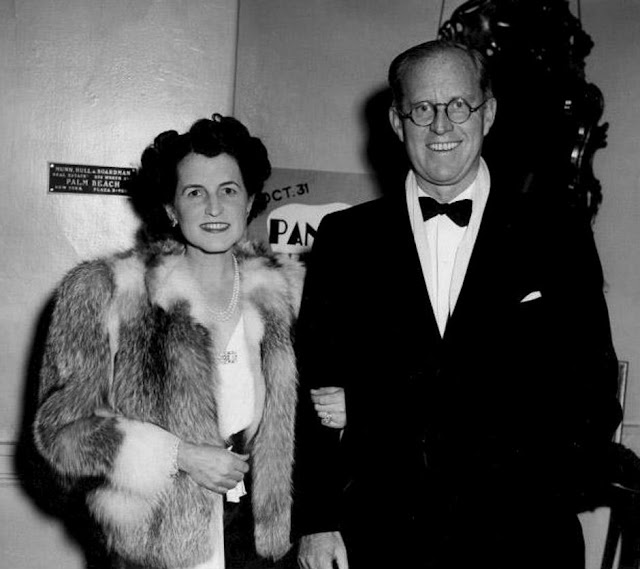 |
| Joseph and Rose Kennedy at the Colony restaurant in New York, November 1, 1940. Joseph Kennedy is the US Ambassador to the Court of St. James. |
U-124 (Kptlt. Georg-Whilhelm Schulz) continues stalking Convoy HX 82 - it sank freighter Rutland yesterday - and picks off another straggler in the shipping lanes west of the Outer Hebrides. This time it is 5612-ton freighter Empire Bison, which U-124 torpedoes and sinks quickly as it is carrying heavy scrap steel and 94 trucks. There are only four survivors (31 dead), and they play dead in their lifeboat when the U-boat comes over to them so as not to be captured. They are later picked up by Danish merchant Olga S.
The Luftwaffe bombs and sinks British lightship East Oaze Lightship in the Thames Estuary.
The Luftwaffe attacks Convoy FS 22 in the Thames Estuary and bombs and sinks 1317 ton British collier Letchworth. There is one death.
The Luftwaffe bombs and sinks 279 ton Royal Navy trawler HMT Tilburyness in the Thames Estuary. There are ten deaths.
The Luftwaffe bombs and sinks 83 ton Royal Navy trawler HMT Torbay II in The Downs, Kent.
The Luftwaffe bombs and damages patrol sloop Pintail, an escort of Convoy FS 323, in the Thames Estuary. There are ten deaths (including Lt Cdr T. H. Hill-Walker) and three wounded.
The Luftwaffe bombs and damages sloop Black Swan near the Firth of Forth. It makes it to port with no casualties.
Norwegian freighter Hundvaag hits a mine and sinks in the English Channel off Dover. There are 14 survivors and one death.
Dutch coaster Santa Lucia hits a mine and sinks in the Belfast Lough. Four crew perish. This was in German minefield "Alfred."
German 690 ton schooner Dietrich Hasseldieck hits a mine and sinks in the Baltic off Tallinn, Estonia.
The Italians have 9 submarines operating from their base at Bordeaux. The Italian submarine fleet is large, but inefficient, sinking far fewer ships than U-boats per patrol. They also sink far more neutral shipping than the U-boats.
The British mine the Bay of Biscay, a key transit point for U-boats going to their stations on the convoy routes.
Convoy WS 4A (Winston Special) departs the Clyde and Liverpool. It has 8 troopships and 8 freighters, with a heavy escort lead by cruiser HMS Cornwall. It carries troops and weapons bound for the Middle East. Convoy WS 3C, meanwhile, departs Capetown for Suez via Aden.
Convoy FS 325 departs from Methil, Convoy HX 85 departs from Halifax, Convoy BHX 85 departs from Bermuda, Convoy SLS 54 departs from Freetown.
Royal Navy corvette HMS Heather (K 69, Commander James G. C. Gibson) is commissioned.
Battle of the Mediterranean: Royal Navy light cruiser Ajax lands troops of the 2nd Battalion of the York and Lancaster Regiment at Suda Bay. The Italians bomb the Royal Navy ships in the harbor and almost hit the Ajax.
RAF bombers from Malta and the Fleet Air Arm bomb Naples and Brindisi, as well as Italian supply ports in Albania. The Malta-based bombers target Naples seaport, industrial zones, and railway installations. Italian fighters attack two Short Sunderland flying boats of RAF No. 228 Squadron based on Malta, one of which is performing normal reconnaissance over Sicily. That flying boat is lost, the other, on a search and rescue mission is badly damaged.
 |
| Dean Martin performing on 1 November 1940. It is Martin's opening night at the Vogue Room at the Hollenden House in Cleveland with Sammy Watkins and His Orchestra. |
German Military: General Paul Ewald von Kleist takes command of the 1st Panzer Group (Panzergruppe).
British Military: The government institutes the Military Medal for women. The first three winners are members of the WAAF.
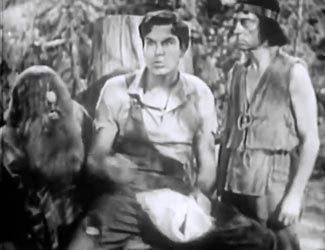 |
| A shot from "Li'l Abner." Shown are Jeff York and Buster Keaton. |
Chuichi Nagumo becomes commandant of the Japanese naval war college. Captain Shunji Izaki becomes commanding officer of old battleship Settsu. Rear Admiral Keizo Tanimoto replaces Rear Admiral Isamu Takeda as chief of staff of Vice-Admiral Boshiro Hosogaya (Ryojun Military Port, northeastern China).
Battleship Musashi, the largest fighting ship in the world (then and now), is launched.
New Zealand Military: The New Zealand 8th Infantry Brigade begins arriving in the Fiji Islands.
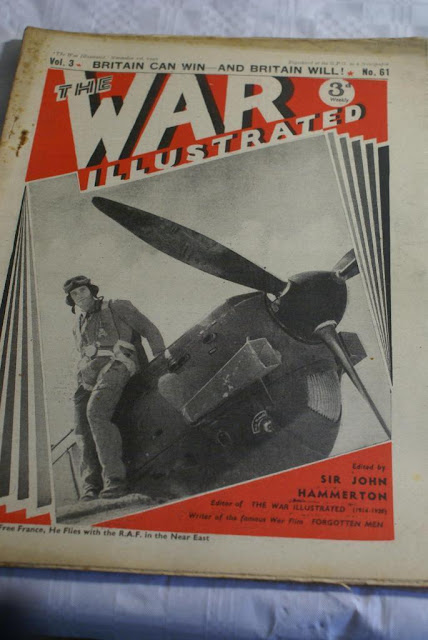 |
| The War Illustrated, Vol 3 No 61, November 1, 1940. |
US General Jonathan Wainwright arrives in Manila aboard US transport Grant to command the Phillippines Division under General MacArthur.
The Submarine Force, Scouting Force is split up into:
- Submarines Scouting Force, Pacific Fleet (Admiral Wilhelm L. Friedell)
- Submarines, Atlantic Fleet.
At the continuing Battle of South Kwangsi, the Japanese 22nd Army continues its withdrawal to Hainan Island.
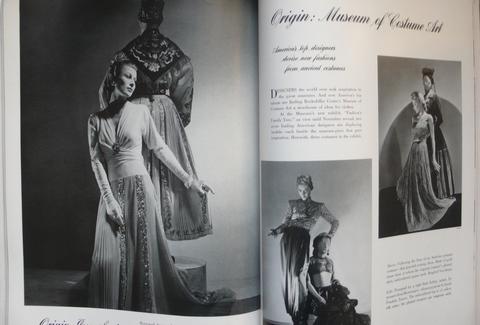 |
| Inside Vogue, 1 November 1940. |
American Homefront: "Li'l Abner" is released. Based on the famous comic strip by Al Capp, it is directed by Albert S. Rogell and stars Jeff York, Martha O'Driscoll and Buster Keaton. Milton Berle helps to write the title song.
In Brooklyn, New York, President Franklin D. Roosevelt gives a campaign speech in which he discusses the Third Reich:
Those forces hate democracy and Christianity as two phases of the same civilization. They oppose democracy because it is Christian. They oppose Christianity because it preaches democracy… We are a nation of many nationalities, many races, many religions bound together by a single unity, the unity of freedom and equality…
Whoever seeks to set one nationality against another, seeks to degrade all nationalities. Whoever seeks to set one race against another seeks to enslave all races… So-called racial and religious voting blocs are the creation of designing politicians who profess to be able to deliver them on Election Day… But every American citizen…will scorn such unpatriotic politicians. The vote of Americans will be American – and only American.Franklin Roosevelt would not recognize modern American politics.
Future History: Barry Allen Sadler is born in Carlsbad, New Mexico. He enlists at 17 in the US Air Force, then enlists in the US Army. He joins the Special Forces and is shipped to South Vietnam, where he is badly wounded in the knee. While recovering, he records "The Ballad of the Green Berets," which tops the Billboard Hot 100 chart for five consecutive weeks in March/April 1966. The song sells a million copies, as does a related album that he records. He also records "The A Team," which also charts that year (and in the '80s becomes the name of a popular military-themed television series). Sadler later is convicted of voluntary manslaughter in a dispute over a woman, and then is shot in Guatemala City, which causes brain damage. Sadler passes away in November 1989.
 |
| Vogue, 1 November 1940. |
October 1940
October 1, 1940: Wait Daddy October 2, 1940: Hitler's Polish Plans
October 3, 1940: British Cabinet Shakeup
October 4, 1940: Brenner Pass Meeting
October 5, 1940: Mussolini Alters Strategy
October 6, 1940: Iron Guard Marches
October 7, 1940: McCollum Memo
October 8, 1940: Germans in Romania
October 9, 1940: John Lennon Arrives
October 10, 1940: Führer-Sofortprogramm
October 11, 1940: E-Boats Attack!
October 12, 1940: Sealion Cancelled
October 13, 1940: New World Order
October 14, 1940: Balham Tragedy
October 15, 1940: Mussolini Targets Greece
October 16, 1940: Japanese Seek Oil
October 17, 1940: RAF Shakeup
October 18, 1940: Convoy SC-7 Catastrophe
October 19, 1940: Convoy HX-79 Catastrophe
October 20, 1940: Convoy OB-229 Disaster
October 21, 1940: This Evil Man Hitler
October 22, 1940: Aktion Wagner-Burckel
October 23, 1940: Hitler at Hendaye
October 24, 1940: Hitler and Petain
October 25, 1940: Petain Woos Churchill
October 26, 1940: Empress of Britain Attack
October 27, 1940: Greece Rejects Italian Demands
October 28, 1940: Oxi Day
October 29, 1940: US Draft Begins
October 30, 1940: RAF Area Bombing Authorized
October 31, 1940: End of Battle of Britain
November 1940
November 1, 1940: Hitler Irate
November 2, 1940: U-31 Sunk - Again
November 3, 1940: Kretschmer's Master Class
November 4, 1940: Spain Absorbs Tangier
November 5, 1940: Jervis Bay Meets Admiral Scheer
November 6, 1940: San Demetrio Incident
November 7, 1940: Galloping Gertie
November 8, 1940: Italian Shakeup in Greece
November 9, 1940: Dutch Fascists March
November 10, 1940: Fala and Doc Strange
November 11, 1940: Taranto Raid
November 12, 1940: Molotov Takes Berlin
November 13, 1940: Molotov Foils Hitler
November 14, 1940: Moonlight Sonata
November 15, 1940: Warsaw Ghetto Sealed
November 16, 1940: France Keeps Battleships
November 17, 1940: Malta Hurricane Disaster
November 18, 1940: Hitler Berates Ciano
November 19, 1940: Birmingham Devastated
November 20, 1940: Hungary Joins Axis
November 21, 1940: Dies White Paper
November 22, 1940: Italians Take Korçë
November 23, 1940: U-Boat Bonanza!
November 24, 1940: Slovakia Joins In
November 25, 1940: Molotov's Demands
November 26, 1940: Bananas Be Gone
November 27, 1940: Cape Spartivento Battle
November 28, 1940: Wick Perishes
November 29, 1940: Trouble in Indochina
November 30, 1940: Lucy and Desi Marry
2020
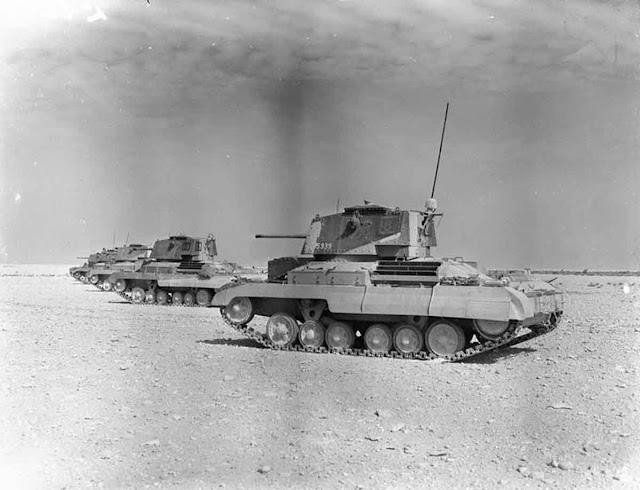

No comments:
Post a Comment